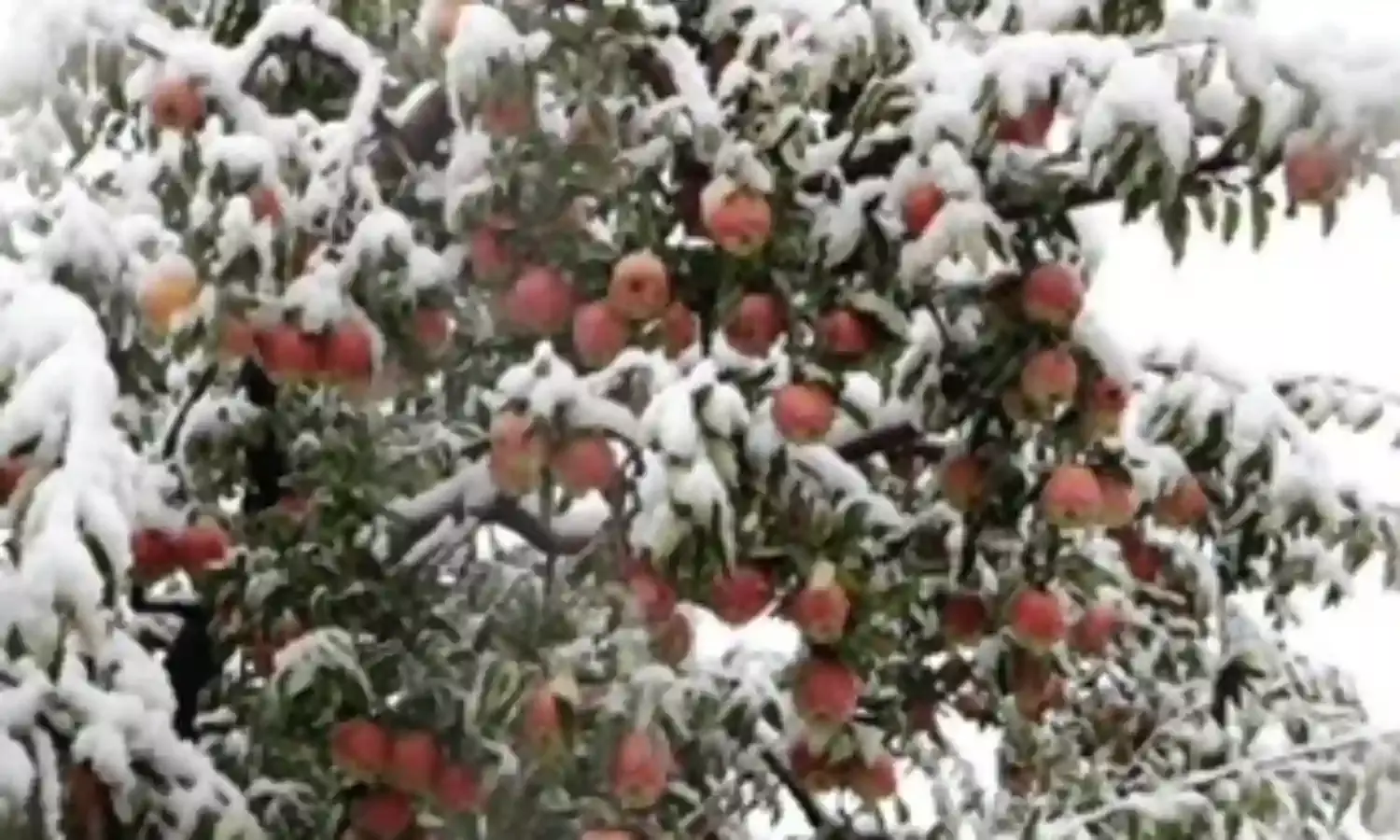Another Blow for Kashmiri Apple Growers as Iranian Imports Hit Prices, Crop Health
'The local growers have first right over the market'

SRINAGAR: Mohammad Ashraf is an apple orchardist and president of a local fruit Mandi in the Shopian district in south Kashmir.
He is a worried person for the past couple of weeks; he has been talking to the press and holding meetings with farmer leaders from across the Valley and the neighbouring hill states of Himachal Pradesh and Uttrakhand, leaders who were in the Valley a few days ago.
The reason for his uneasiness is the arrival of Iranian apples into the Indian market in bulk quantity.
“The Iranian apple has arrived in Indian market in thousands of tonnes. It is posing a great threat to our interests as the rates of Kashmiri apple have started to fall since its arrival in November,” says Ashraf. “Initially, the supply was gradual and then it gained pace."
He thinks the Iranian apple is far below Kashmiri apple in taste and quality, but sells at a lower price.
“Customers are lured towards the cheaper product due to which demand for our apple plummeted,” Ashraf explains. “The Iranian exporters face a trade ban by neighbouring countries in the Middle East, and they have no alternative than to sell their produce at low rates in India, their only export market at this time.”
Apple is the biggest industry in the agriculture sector of Jammu and Kashmir, considered the backbone of the regional economy. Around 16 lakh hectares of land in Jammu and Kashmir are under apple cultivation, yielding more than 18 lakh tonnes of apple each year.
The apple harvest begins from October. After plucking the apples from trees and packing them in boxes, the fruit is supplied to mandis across the country. However, many growers and dealers store their apple crop under controlled atmospheric conditions in cold storage facilities, to sell them later when demand in the market is high.
Ashraf and other apple growers say that more than 1.5 crore apple boxes are lying in different cold storage facilities in Kashmir, besides the produce that growers have stored at their own places. Ashraf himself has stored around 23,000 apple boxes in a cold storage facility.
“If this import is not stopped the apple industry of Jammu and Kashmir, which generates employment for around 3.5 million people, will be ruined,” says Ghulam Nabi, vice president of the fruit mandi in Pulwama.
He states that the apple industry of Jammu and Kashmir has come under persistent stress for past few years.
Early snow in 2018 damaged 30% of the apple trees. In 2019 a lot of fruit rotted in cold stores after the eruption of the pandemic triggered the closure of mandis. The growers suffered a huge loss and were unable to pay storage charges to the cold store owners.
This year a recovery was witnessed till mid November, with the Kashmiri apple selling for 1100–1300 rupees per 16 kilos. After the arrival of Iranian apple the rates fell to 700–950, says Ghulam Nabi.
“We suffer a loss of Rs 400 per box, and if this continues the situation of 2019 will be repeated: the fruit will rot in cold stores and we will be unable pay rent to them,” he explains.
Soon the fruit growers and dealers of north Kashmir’s Sopore district hit the streets. Sopore is known as the apple town of Kashmir for growing the highest number of apples. They were demanding an immediate ban on the import.
The fruit dealers said that Iranian apple is camouflaged as Afghan apple and comes through Afghanistan.
Representatives of valley fruit growers and dealers, an apex body of fruit growers associations, held meetings with their counterparts from Himachal Pradesh and Uttrakhand here in Srinagar a few days ago.
They pressed for a joint strategy to deal with what they termed the dirty tactics of Iran.
The trade body also wrote a letter to Prime Minister Narendra Modi on the issue requesting him to protect their interests.
However, Ashraf said that Iran apples are arriving directly from Iran through the port route, not through Afghanistan.
He added that the local growers from Jammu and Kashmir, Himachal and Uttrakhand produce enough apple to fulfill the demand.
“The local growers have first right over the market,” Ashraf said. “The government of India should protect the local industry. We demand that the rate of tax be increased from the current 15% to 35%, and the rate of cess from 35 to 100% on the imports.”
Domestic growers and dealers have other reason to worry: Iranian apple imports may bring new pests from Iran into Kashmir, proving detrimental to the apple orchards here.
“Horticulture experts report the occurrence of up to 45 fungal diseases in Kashmir apple while Iranian apple is infected with up to 350 diseases. If these pests are imported with Iranian apple it will turn disastrous for our orchards,” the growers said.
Their concerns were recently affirmed by researchers at the Share Kashmir University of Agricultural Sciences and Technology (SKUAST) in Srinagar, who redflagged Iranian pest-infected kiwis arriving in the Indian market as a potential threat to Kashmir’s apple industry.
Representatives of fruit growers and dealers also had a meeting with the director-general of horticulture for Kashmir, Aijaz Ahmad Bhat, and sought his intervention.
They say they were assured that the issue will be taken up with higher authorities.
“We wrote a letter to our government; they will take up this matter with New Delhi,” said Bhat, adding that it was all they could do.
Till a response comes from New Delhi, the Iranian apple continues to be a nightmare for the apple growers of Kashmir.
Cover Photograph BASIT ZARGAR



